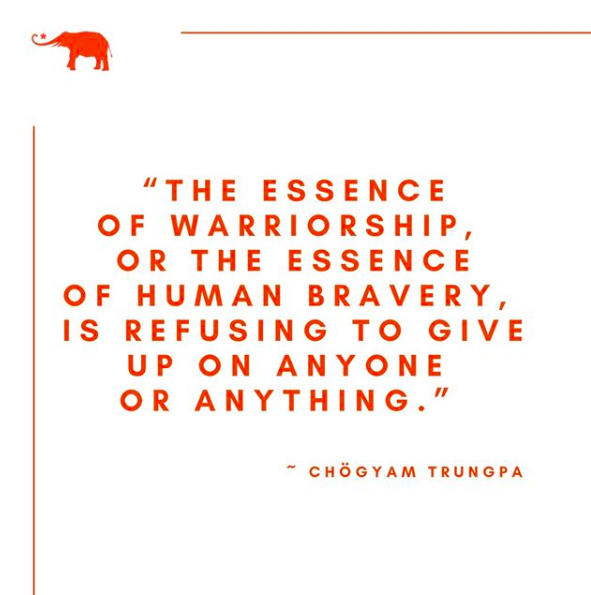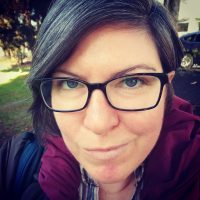Walking down the street, on my way home, with that familiar piercing ache in my chest…I was crying again—in public.
My heart was crying, so my eyes couldn’t help but follow.
In my head, all I was hearing was:
He doesn’t like you back. There’s no way! You’re an old hag now—an old, fat hag. I mean, look at all of this gray hair! Your face is starting to sag. Hag!
You should’ve had a real job with a real paycheck by now. You’re too late! You’re too old now and with all of the wrong experience. You made all of the wrong choices. You’re not good enough to do what you really want. You are stuck forever!
No one is going to want me.
I wanted, so badly, to finally be good enough. To be good enough for him. To be good enough for that job. To be good enough to succeed.
I kept wiping the tears off my cheeks and making those soft gasping sounds we make when our insides are cracking—when we’re desperately trying to hold it all together under our skin.
As soon as I was home, I felt a nudge to pick up Brené Brown’s Daring Greatly again. In those pages, I saw the same soul-wrenching, gut-wincing, “I’m not good enough” thoughts that were plaguing me. They were demonstrating the shame experience.
Brown defines shame as “the intensely painful feeling or experience of believing we are flawed and therefore unworthy of love and belonging.”
I blinked as a stunned ohhhhh emerged from my throat—understanding of my situation flooded my mind.
This is shame!
I had encountered someone who makes my entire body blush while glitter bombs explode in my stomach. I was putting myself out there professionally, in pursuit of a dream (with all of the implications for our physical survival work has for us), and I am turning 40—all intensely vulnerable experiences and big shame triggers.
In other words, this was all a big test on choosing to love myself.
So, in the face of my greatest vulnerability, and my deepest shame, my shame monster was calling on me to armor-up through perfectionism.
All those negative thoughts came with the implication that if I were thinner, prettier, younger, better experienced—you know, perfect—none of this rejection would happen.
Only then would I be good enough.
We all know this is bullsh*t. One benefit of turning 40 soon is that I’ve learned, and experienced, enough to know perfectionism doesn’t lead to where, or who, I want to be.
However, it is fascinating to see how much these perfectionist habits still infiltrate my way of being in the world—how tightly and controlled I hold myself. How closed off and defensive I am while going about my day. How invulnerable I want to make myself. How much armor I’m still wearing.
Choosing to love myself means I have to choose to live with wholeheartedness and to dare greatly in my life, because self-love requires nothing less than vulnerability and complete courage.
Brené Brown defines courage as: “to tell the story of who we are with our whole heart.”
These challenges and tests are essential.
It’s not a torment from a cruel universe or demon. It is simply part of the process. As poignantly painful as all of this is, the test is so beneficial.
How else would I know where I am? How else would I see how far I’ve come, and exactly where I still have work and healing to do? How else would I see the potential of my growth? It feels so messy and, at first glance, like I’ve fallen behind or failed to grow at all, but as my friend and fellow Elephant writer, Joanna Engman, says:
“This is actually what healing looks and feels like. It’s messy. It doesn’t necessarily feel good.”
And it’s not easy. It’s not easy to believe better is around the corner when we are rejected by our crush, or denied that new professional opportunity.
This is where I’ve found myself tested the hardest, and where I find myself falling into a trap of scarcity. I start thinking there will never be anyone else; there will never be another opportunity for development.
Loving myself is a huge part of my growth, but there is another important component to all of this: faith.
In another one of her books, The Gifts of Imperfection, Brené Brown defines faith, one of the cornerstones of wholeheartedness, as: “a place of mystery, where we find the courage to believe in what we cannot see and the strength to let go of our fear of uncertainty.”
It can feel so hard to be firm and say “no, I deserve better than this,” or “there is more than this,” when better and more are nowhere to be seen.
It’s like the Buddhist story of setting off from a point of familiar shore across the vast ocean on a raft. Once that familiar shore is out of sight, and the new shore is still far from view and unmanifested, this is where the test truly begins. This is when we must have that faith, as Brown defines it.
This is trusting in basic goodness—of the Universe, and in ourselves. This kind of faith is what drives persistence and perseverance.
I’ve been told the secret to life is to fall down six times and get up seven. We keep getting up, we keep getting tested, we keep telling the story of who we are with our whole hearts, and we keep loving ourselves along the way.
So, what now? Now that I see all that I see, what do I do going forward?
I’m going to remember, and understand, that none of these rejections have anything to do with my inherent worth as a human being. That just because I don’t fit there, or with him, doesn’t mean I won’t fit somewhere or with someone.
That either way, lover or job, I will be okay.
That either way, yes or no, I am worthy.
I know this when I find some stillness, and come back to my center, and remember who I am. When I remember this, I feel my wholeness; I feel my completeness. Everything feels expansive and warm—brilliantly alive.
Knowing this reminds me there is no benefit in hanging around my crush, as a “friend” or otherwise, hoping he’ll change his mind, or that I’ll somehow prove myself to him and earn his affection.
I have to move on.
Knowing this reminds me to get back up and to keep trying, and to keep looking. It reminds me to ask better questions, and look for new ways to develop myself. I have to keep going.
It reminds me to embrace that wild unknowing stretching out before me. It returns to me a sense of adventure and curiosity. Anything is possible. Miracles abound. Everything can change in an instant.
But it can’t if I insist on clinging to the familiar and already decided. If I’m convinced there can be nothing and no one else, if I stay crumpled on the ground stuck in scarcity, fear, and bereft of potentiality.
Self-love is crying when I need to. It’s getting back up with all of my hurt, hope, and broken pieces. It’s taking a deep breath, remembering and re-centering, then walking out into all of the wild, unexplored territory of this life with my open and vulnerable, but oh so strong and brave, heart.
AUTHOR: JENNIFER EDWARDS


No comments:
Post a Comment